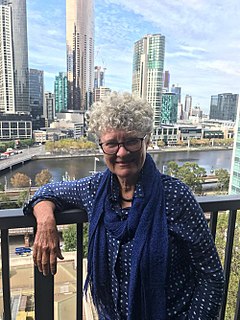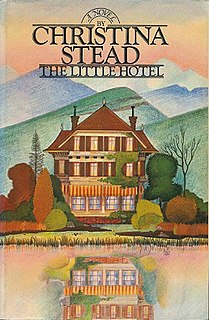
Christina Stead was an Australian novelist and short-story writer acclaimed for her satirical wit and penetrating psychological characterisations. Christina Stead was a committed Marxist, although she was never a member of the Communist Party. She spent much of her life outside Australia, although she returned before her death.

Mrs Dalloway is a novel by Virginia Woolf that details a day in the life of Clarissa Dalloway, a fictional high-society woman in post–First World War England. It is one of Woolf's best-known novels.
Maurice Baring was an English man of letters, known as a dramatist, poet, novelist, translator and essayist, and also as a travel writer and war correspondent. During World War I, Baring served in the Intelligence Corps and Royal Air Force.

Catherine Elizabeth Grenville is an Australian author. She has published fifteen books, including fiction, non-fiction, biography, and books about the writing process. In 2001, she won the Orange Prize for The Idea of Perfection, and in 2006 she won the Commonwealth Writers' Prize for The Secret River. The Secret River was also shortlisted for the Man Booker Prize.

The Man Who Loved Children is a 1940 novel by Australian writer Christina Stead. It was not until a reissue edition in 1965, with an introduction by poet Randall Jarrell, that it found widespread critical acclaim and popularity. Time magazine included the novel in its TIME 100 Best English-language Novels from 1923 to 2005. The novel has been championed by novelists Robert Stone, Jonathan Franzen and Angela Carter. Carter believed Stead's other novels Cotters England; A Little Tea, A Little Chat; and For Love Alone to be as good, if not better than The Man Who Loved Children.
Charlotte Wood is an Australian novelist. The Australian newspaper described Wood as "one of our [Australia's] most original and provocative writers".
Literary realism is a literary genre, part of the broader realism in arts, that attempts to represent subject-matter truthfully, avoiding speculative fiction and supernatural elements. It originated with the realist art movement that began with mid-nineteenth-century French literature (Stendhal) and Russian literature. Literary realism attempts to represent familiar things as they are. Realist authors chose to depict everyday and banal activities and experiences.

Tara June Winch is an Australian writer. She is the 2020 winner of the Miles Franklin Award for her book, The Yield.
Michelle de Kretser is an Australian novelist who was born in Sri Lanka, and moved to Australia in 1972 when she was 14.

Letty Fox: Her Luck is Australian-born author Christina Stead’s sixth novel. It is a tribute to the drama of the urban environment and its role in socializing its occupants. Published in 1946, Stead wrote the lengthy Letty Fox after living in New York City for seven years. The cosmopolitan setting serves well as the theater in which Stead develops her characters through their adventures with numerous careers, love affairs, familial obligations, and sensitivities to reputation. To this end, Letty Fox has been described as “a modern picaresque novel and psychological novel at the same time.”
Thistle Yolette Harris, also known as Thistle Stead, was an Australian botanist, educator, author and conservationist.

I'm Dying Laughing: The Humourist is a novel by Christina Stead (1902–1983). It was published posthumously by Virago Press in 1986, edited and with a preface by Ron Geering.
Georgia Frances Elise Blain was an Australian novelist, journalist and biographer.

Shanghai Dancing is a 2003 novel by Australian novelist Brian Castro.
This article presents a list of the historical events and publications of Australian literature during 1934.

The Beauties and Furies (1936) is a novel by Australian writer Christina Stead.

House of All Nations (1938) is a novel by Australian writer Christina Stead.

A Little Tea, a Little Chat (1948) is a novel by Australian writer Christina Stead.

The Little Hotel (1973) is a novel by Australian writer Christina Stead.

The Fear (1965) is a novel by Australian writer Thomas Keneally. The novel is also known by the title By the Line.













